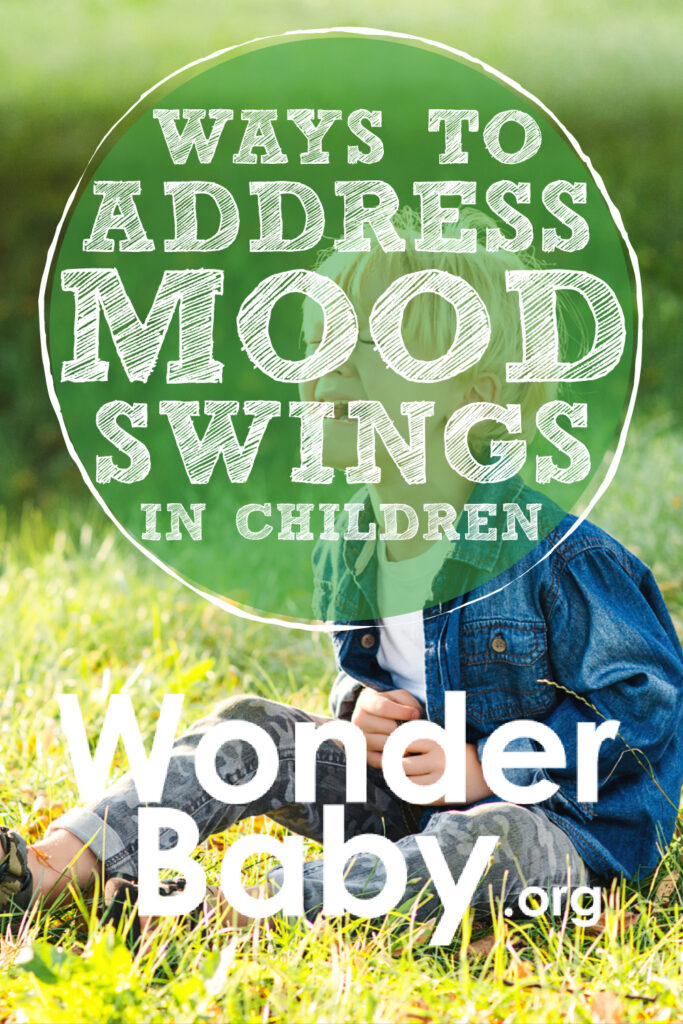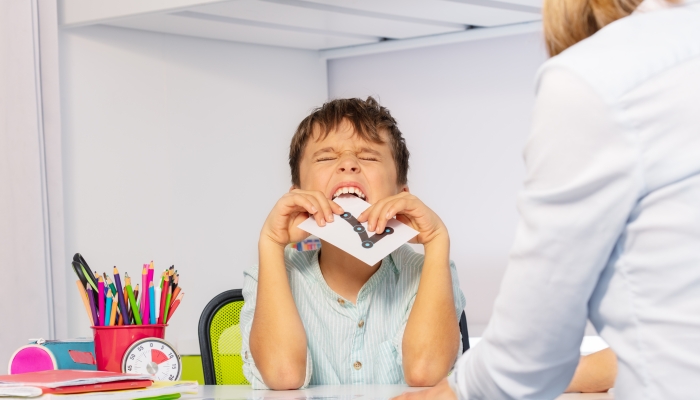6 Ways to Address Mood Swings in Children

- Mood swings are common in children as they work to learn emotional regulation.
- Some mental health conditions can make children more likely to struggle with mood changes.
- Even children and teens with mental health issues can learn to manage their disruptive behavior.
- Modeling good behavior and teaching coping skills are essential for addressing behavior problems and big emotions in children and teens.
Young children throwing themselves on the floor is a relatively common, if unfortunate, experience. Teenagers are also known for having occasional mood swings and sometimes participating in risky behavior.
However, it’s important to remember that extremely low frustration tolerance, trouble concentrating, behavior problems, and suicidal thoughts are not normal for all children and should be addressed.
Mood swings in children can be caused by traumatic events or imbalances in brain chemicals, and parents should work with their healthcare providers to find solutions that work for their children.
In addition to working with a pediatrician or mental health professional, there are a lot of things that you can do at home to help manage your child’s extreme mood swings.
1. Establish a Stable Routine

Often, mood swings in children can be attributed to overstimulation, too little sleep, or a child not knowing what to expect. Maintaining consistent sleep, eating, study, and quiet time schedules can help your child combat an irritable mood or behavioral problems.
Establishing a routine is more than just sticking to specific times for certain activities. For example, a bedtime routine should happen at the same time each night, and have the same series of steps, such as brushing teeth, reading a story, and then going to sleep.
Children and adolescents feel less anxiety and feel more in control of their environment when they know what to expect. When changes in routines are unavoidable, make sure to give your children a warning and explain to them why changes will be necessary.
2. Teach Coping Skills

Children and adolescents are fast learners and are more capable than some adults realize. Studies show11. Mishara, B. L., & Ystgaard, M.. Effectiveness of a mental health promotion program to improve coping skills in young children: Zippy’s Friends. Early Childhood Research Quarterly. 2006;21(1), 110–123. https://doi.org/10.1016/j.ecresq.2006.01.002 that children who are taught specific coping skills are able to handle frustration and difficult social situations more effectively than their peers.
Coping skills for children don’t have to be complex or lengthy. Teaching your child a few deep breathing exercises or helping them recognize what may trigger symptoms of anxiety are healthy ways to deal with mood swings.
Children with mood disorders may need the help of a trusted adult to help them calm their racing thoughts or get out of a depressive episode. Make sure your child understands that it’s always okay to tell someone when they’re struggling.
3. Encourage Physical Activity and Healthy Lifestyle

Healthy foods, avoiding too many added sugars, eliminating caffeine, and even sticking to sensory-friendly foods can help your child manage their feelings and may improve depressive symptoms.
In addition, most children and adults find that a depressed or irritable mood improves with physical activity, especially if it’s outdoors. Pediatricians from Massachusetts General Hospital22. Physical Activity and Mental Health: What is the Connection? Massachusetts General Hospital. 2020. https://www.massgeneral.org/children/physical-activity/mental-health encourage parents to help their children reach a goal of spending 60 minutes exercising each day.
A healthy lifestyle also includes avoiding drugs and alcohol. Unfortunately, many adolescents and even children have access to illicit drugs and alcohol. Using these substances can result in a substance-induced mood disorder.
4. Set Clear Boundaries and Expectations

Kids learn by experimenting and pushing boundaries. It’s completely normal for children to see what they can get away with and how far their behavior can go before their parents will put a stop to it.
Unfortunately, if a child learns that throwing themselves on the floor, hitting, or screaming gets them what they want, they’ll continue to behave that way. Setting clear boundaries and expectations can eliminate many behavioral problems associated with mood disorders.
When setting limits on behavior, do your best to remain calm. Professionals at the Children’s Hospital of Philadelphia33. Lewis, J., & Zahn, A.. The Do’s and Don’ts of Disciplining Your Child. Children’s Hospital of Philadelphia. 2019. https://www.chop.edu/news/health-tip/dos-and-donts-disciplining-your-child explain that a strong reaction, even a negative one, may give the child the attention that they crave. Remaining neutral or even ignoring poor behavior may make your child lose interest in making a scene.
5. Ask for Help from a Professional

If your child seems to have extreme mood swings, you have a family history of mental illness, or your child’s behavior is out of control, you may want to ask for help from a professional. A child psychiatrist will ask about your child’s symptoms and may be able to give your child a diagnosis and a plan to help them improve.
Experts at the Centers for Disease Control44. Mental illness in children: Know the signs. Mayo Clinic. 2024. https://www.mayoclinic.org/healthy-lifestyle/childrens-health/in-depth/mental-illness-in-children/art-20046577 warn that children, like adults, can struggle with a variety of mental health disorders. These may include:
- Bipolar disorder
- Disruptive mood dysregulation disorder
- Persistent depressive disorder
- Major depressive disorder
- Attention deficit hyperactivity disorder
- Premenstrual dysmorphic disorder
- Obsessive-compulsive disorder
- Oppositional defiant disorder
- Anxiety disorder
While the thought of your child suffering from a mood disorder can be scary, remember that many children and adolescents are able to deal with their mood disorders in a healthy way. Your child’s life can still be full of meaning and joy, despite their difficulties.
6. Set a Good Example

One of the best things you can do to help your child learn to manage their big feelings is to set a good example. Parenting styles and the behavior your child observes can have a significant impact on the way they face challenges in their own life.
Children watch how their parents respond to bad news, problem-solve, react to inconvenient surprises, and interact with others. Kids who have calm parents are more likely to stay calm as well. Michigan State University55. Rymanowicz, K.. Monkey see, monkey do: Model behavior in early childhood. MSU Extension. 2015. https://www.canr.msu.edu/news/monkey_see_monkey_do_model_behavior_in_early_childhood states that kids are observational learners, meaning they are more likely to mimic a parent’s behavior than do what a parent says.
FAQs
How can I teach my child to recognize and manage their own mood swings?
A child cannot learn to deal with their mood changes if they don’t recognize them first. Teaching children to name their feelings is a good place to start. There are many picture wheels, books, and even videos available that can help children and teens identify what they are feeling.
Children should also be allowed time to experience their feelings and be validated in their experiences. Rather than telling a child that they should not be upset, encourage them to accept the feeling of being upset and deal with it.
It’s not fair to expect a child to always be happy and calm. Let your kids know that feelings like anger or sadness are perfectly normal, but poor behavior is not.
How do I know when it’s time to seek professional help for my child’s mood swings?
It can be difficult for parents to identify depression or another mood disorder in their children. However, there are some signs parents should pay close attention to. If your child experiences extreme mood swings, struggles with social interactions, is falling behind in school, or has major changes in their hygiene or sleep habits, you may need the help of a professional.
Can mood disorders be cured?
Mood disorders generally require lifelong management. Children with depression, ADHD, and other mood disorders may need therapy or even medications for the rest of their lives. While this may sound discouraging, therapy, learning coping skills, and medications can often help people deal with their mood disorders and function to their full potential.
References
- Mishara, B. L., & Ystgaard, M. (2006). Effectiveness of a mental health promotion program to improve coping skills in young children: Zippy’s Friends. Early Childhood Research Quarterly, 21(1), 110–123. https://doi.org/10.1016/j.ecresq.2006.01.002
- Physical Activity and Mental Health: What is the Connection? Massachusetts General Hospital. (2020, December 7). https://www.massgeneral.org/children/physical-activity/mental-health
- Lewis, J., & Zahn, A. (2019, January 29). The Do’s and Don’ts of Disciplining Your Child. Children’s Hospital of Philadelphia. https://www.chop.edu/news/health-tip/dos-and-donts-disciplining-your-child
- Mental illness in children: Know the signs. Mayo Clinic. (2024, January 27). https://www.mayoclinic.org/healthy-lifestyle/childrens-health/in-depth/mental-illness-in-children/art-20046577
- Rymanowicz, K. (2015, March 30). Monkey see, monkey do: Model behavior in early childhood. MSU Extension. https://www.canr.msu.edu/news/monkey_see_monkey_do_model_behavior_in_early_childhood

The information WonderBaby provides is not intended to be, and does not constitute, medical or other health advice or diagnosis and should not be used as such. Always consult with a qualified medical professional about your specific circumstances.
Related Posts

Behavior
Understanding Intermittent Explosive Disorder in Children
Are you worried about your child’s unexpected aggression and explosive behaviors? Learn how to support a child with intermittent explosive disorder.

Behavior
5 Emotional Regulation Activities for Kids
Want to teach your child how to regulate emotions? Here are emotional regulation activities for kids that can help!

Behavior, Special Needs
5 Tips for Dining Out with Children Who Have Sensory Sensitivities
Worried about dining out with sensory sensitivities? Try these tips for less stress and more fun the next time you take your family out to eat.